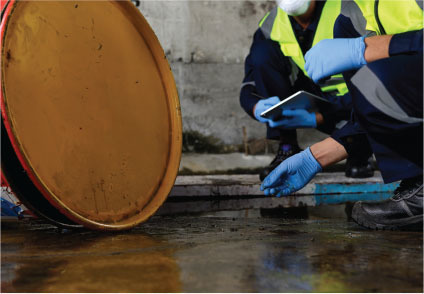July/August 2017
On Ethics: You Be the Judge
Property of… ?
Situation
Howard Kemp, P.E., is an employee of Spur Engineering. Kemp prepares drawings, plans, reports, and specifications for Spur Engineering clients. Kemp maintains copies of drawings, plans, and specifications he has signed and sealed for his personal records in case he needs to refer to them at some point in the future (e.g., matters involving personal or professional liability). Thereafter, Kemp leaves Spur Engineering. The firm learns of Kemp’s copies and demands that he return the copies to them, claiming the drawings, plans, reports, and specifications are the firm’s property. Kemp refuses, claiming that he has a right to the copies as illustrations of his work and in the event of future litigation or related matters.
What Do You Think?
 Was it ethical for Kemp to refuse to return copies of the work to Spur Engineering?
Was it ethical for Kemp to refuse to return copies of the work to Spur Engineering?
What the Board of Ethical Review Said
Professional engineers are hired by employers or clients to prepare drawings, plans, and specifications, which constitute intellectual property. Ownership and use of such property is often a critical issue in the relationship that exists between engineers, employers, and clients. How these issues are resolved sometimes raises ethical questions.
In BER Case No. 06-9, the NSPE Board of Ethical Review examined three scenarios involving an engineer who was in the process of departing from his employer. The engineer had three kinds of files: (1) client files, which included correspondence between the engineer and various clients while employed by his firm and project-specific technical information; (2) technical information files, such as articles, publications, and external reports that the engineer personally received and saved during the course of his employment with the firm to assist him in providing technical and professional services for clients; and (3) personal files, which included personal correspondence received from past and present clients acknowledging and expressing appreciation for the engineer’s work on projects and technical information obtained outside of his employment with the firm.
In deciding that it would not be ethical for Engineer A to take the files under scenarios (1) and (2) but it would be ethical for Engineer A to take the files under scenario (3), the Board noted that NSPE Code of Ethics Section III.9.d makes it clear that an engineer’s designs, data, records, and notes referring exclusively to an employer’s work are the employer’s property and not the property of the engineer.
In the current case, the Board is of a similar view that while Kemp has a legitimate interest in maintaining copies of drawings, plans, and specifications he has signed and sealed for his personal records in the event that he would need to refer to them at some point in the future (e.g., matters involving personal or professional liability), since he performed the work as an employee of Spur Engineering, he and the firm should first discuss and negotiate the terms and conditions of his departure, including the disposition of work prepared by Kemp during his employment with Spur. While it is true that Kemp has legitimate interests in the work he signed and sealed, Spur Engineering also has proprietary and other rights and interests that should be respected by Kemp.
In passing, the Board would note that the ethical questions in this case and earlier cases involving the mutual responsibilities of parties at the time of an engineer’s departure from employment can often be resolved by having a prior written agreement between the parties. The agreement should outline the duties and responsibilities of the parties at the point of termination of employment.
Conclusion
It was unethical for Kemp to refuse to return copies of the work to Spur Engineering. Kemp and Spur Engineering should first discuss and negotiate the terms and conditions of his departure, including the disposition of work prepared by him during his employment with the firm. While it is true that Kemp has legitimate interests in the work he signed and sealed, Spur Engineering also has proprietary and other rights and interests that he should respect.
NSPE Code References
Section III.8.: Engineers shall accept personal responsibility for their professional activities, provided, however, that engineers may seek indemnification for services arising out of their practice for other than gross negligence, where the engineer’s interests cannot otherwise be protected.
Section III.9.: Engineers shall give credit for engineering work to those to whom credit is due, and will recognize the proprietary interests of others.
Section III.9.a.: Engineers shall, whenever possible, name the person or persons who may be individually responsible for designs, inventions, writings, or other accomplishments.
Section III.9.b.: Engineers using designs supplied by a client recognize that the designs remain the property of the client and may not be duplicated by the engineer for others without express permission.
Section III.9.d.: Engineers’ designs, data, records, and notes referring exclusively to an employer’s work are the employer’s property. The employer should indemnify the engineer for use of the information for any purpose other than the original purpose.
For more information, see Case No. 13-10.


 Volunteering at NSPE is a great opportunity to grow your professional network and connect with other leaders in the field.
Volunteering at NSPE is a great opportunity to grow your professional network and connect with other leaders in the field. The National Society of Professional Engineers (NSPE) encourages you to explore the resources to cast your vote on election day:
The National Society of Professional Engineers (NSPE) encourages you to explore the resources to cast your vote on election day:


